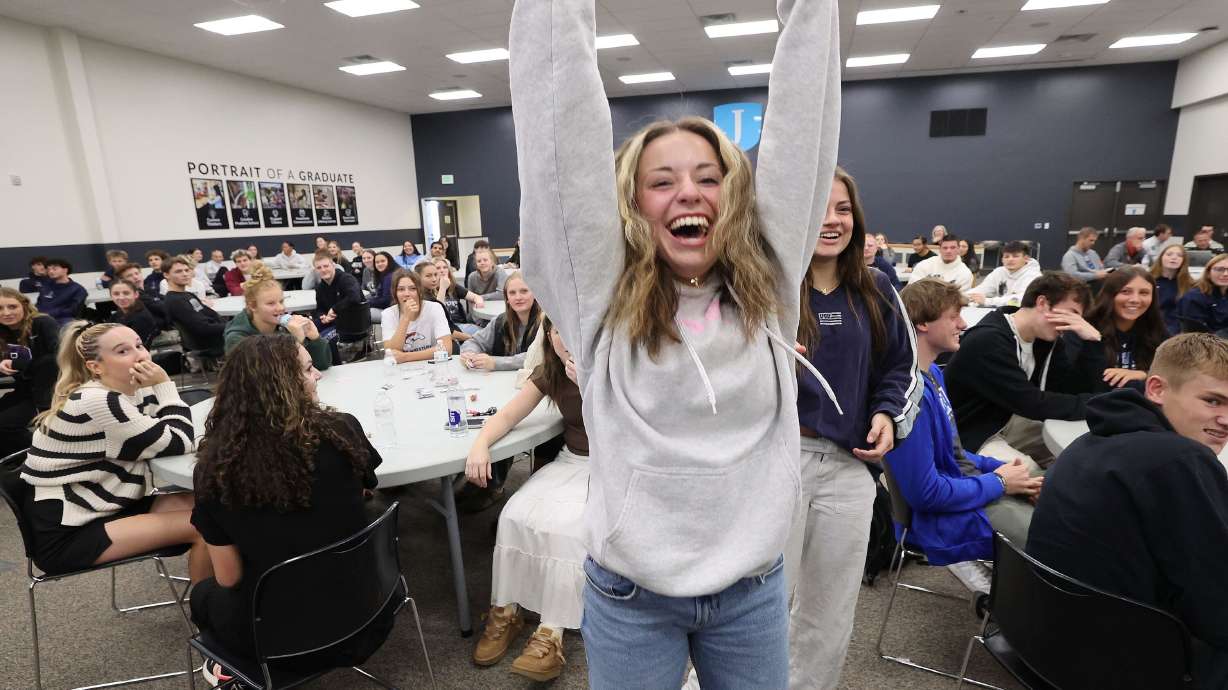Estimated read time: 4-5 minutes
This archived news story is available only for your personal, non-commercial use. Information in the story may be outdated or superseded by additional information. Reading or replaying the story in its archived form does not constitute a republication of the story.
- Positive Coaching Alliance workshops in the Jordan School District aim to enhance student-athletes' experiences.
- Workshops focus on building positive relationships and developing leadership skills among athletes.
- The initiative addresses pressures in youth sports, promoting sportsmanship and personal growth.
RIVERTON — As co-captain of Copper Hills High School's girls wrestling team, Eliza Brunner has a daily goal to be a positive influence for her teammates and coaches.
But Eliza often wages internal battles with a roster of negatives: Self-doubt. Self-criticism. Overthinking. Her co-captain on the Grizzlies wrestling team, Maya French, gets it.
She also knows that a positive word or nod — to others or to one's self — makes winning sweeter, and losing a bit more manageable.
Eliza and Maya are both skilled wrestlers, but they say their capacity to lift their teammates and themselves has sharpened after participating in a Positive Coaching Alliance workshop sponsored by the Jordan School District.
Last week, the two Copper Hills wrestlers got a pass from morning classes and joined scores of other winter sports team captains from the district's six high schools with athletic programs — Bingham, Copper Hills, Herriman, Mountain Ridge, Riverton and West Jordan — for the alliance's student-athlete workshop.
Bryan Veazie, the district's director of athletics and activities, said the Jordan School District implemented the Positive Coaching Alliance workshops to enhance the sports experience for high school student-athletes, along with their parents and coaches. The workshops, offered to both coaches and team captains, focus on building positive relationships and helping student-athletes thrive outside of comfort zones.
The alliance/Jordan District partnership is fueled by a shared goal: to maximize each student-athlete's potential and positive athletic experience at a moment when youth sports are being defined by overwhelming pressures to win and perform at all costs, literally and figuratively.
Triple-impact competitors
The workshop's title at the Nov. 19 gathering: Becoming a triple-impact competitor.
"The goal of the district is to ensure that all of our programs demonstrate the highest level of sportsmanship, class, pride and spirit," said Veazie, introducing the workshop. "We want you as athletes to understand the direct impact that you have on your school culture. We want you to understand the direct impact that you have on the school's overall success, academically as well as athletically.
"You guys are leaders — and you have a huge influence, not only on your teams and not only within the athletic program, but throughout the school, throughout the halls, in your classrooms and anywhere you go in the community."
Jessica Crate-Oveson — an elite track athlete, USA Track & Field coach and a businesswoman, presented the team captains workshop.

High school team captains, she said, enjoy unique, life-altering opportunities to lift others amid competitive sports' turbulent, twisty road of wins, losses, victories and failures.
The workshop is, well, an interactive "team" experience. Throughout the two-hour event, the young athletes were up and down, swapping experiences and hollering out ideas.
The raucous atmosphere was much more "basketball playoff game" than "golf tournament."
Sporting athletic gear and running shoes, Crate-Oveson scurried from one end of the auditorium to the next with microphone in hand, encouraging her audience to claim ownership of the workshop with their thoughts, suggestions and opinions.
Triple-action competitors, she taught, impact sport on three levels: They improve themself. They improve their teammates. And they improve the game.
It's essential that student-athletes master sports' "ELM Tree": Effort. Learning. Mistakes.
Growth comes from exerting maximum effort, learning each day and then allowing others (and one's self) to make mistakes. To "fail forward."

Team captains fill emotional tanks
Crate-Oveson asked all the student-athletes to stand, find and partner and play a round of Rock-Paper-Scissors. The losers sat down — the winners remained standing and found another standing winner to play the next elimination round. The do-or-die Rock-Paper-Scissors games continued until there were only two young athletes standing — a wrestler and a drill team member.
She then called the two to the front of the auditorium to determine who would be the workshop's Rock-Paper-Scissors champ. They played two rounds.
For the first-round, the audience was told to be negative. Everyone booed the finalists — and they visibly flinched.
For the second round, the audience was instructed to be positive. Everyone cheered. The reaction from the Rock-Paper-Scissors finalists was far more pleasant.
The same negative or positive response applies to sports teams, said Crate-Oveson.
"You guys all saw what happened to the two girls up here when we were booing them and critiquing them. They froze. That's not a good feeling. But as soon as we flipped the script and you guys were positive and cheering and affirming. They were able to focus, and they got the job done right."
Before you choose to toss criticism at a teammate, check in with them. Ask how they're doing.
"Ask, and then listen," she added. "We have two ears and one mouth for a reason. Ask, and then listen to understand."











